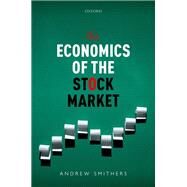The Economics of the Stock Market
, by Smithers, Andrew- ISBN: 9780192847096 | 0192847090
- Cover: Hardcover
- Copyright: 6/22/2022
The current consensus economic model, the neoclassical synthesis, depends on aprioristic assumptions that are shown to be invalid when tested against the data and fails to include finance. Economic policy based on this consensus has led to the financial crisis of 2008, the 'Great Recession' that followed, and the slow subsequent rate of growth. In The Economics of the Stock Market, Andrew Smithers proposes a model that is robust when tested, and by including the impact of the stock market on the economy, overcomes both these defects. The faults of the current consensus model are shown to result typically from an unscientific methodology in which assumptions are held to be valid despite their incompatibility with data evidence. Smithers demonstrates examples of these faults: the Miller/Modigliani Theorem (the assumption that leverage does not affect the value of produced capital assets); the assumption that short-term and long-term interest rates, and the cost of equity capital, are co-determined; and the assumption that the decisions of corporate managements aim to maximise the present value of corporate assets ('profit maximisation') rather than the value determined by the stock market. The Economics of the Stock Market proposes a model that includes and explains the stationarity of real returns on equity, based on the interaction of the differing utility preferences of the managers of companies and the owners of financial capital. These claims are highly controversial, and Smithers proposes that the relative merits of the neoclassical synthesis and this proposed alternative can only be properly considered through public debate.







